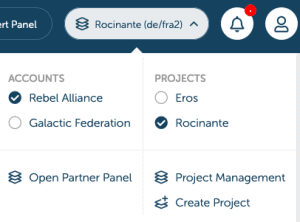The Machine Room
In the “News from the machine room” article series, we regularly post content detailing exciting new products and relevant updates to our wide range of offerings. Would you like to try out for yourself what we write about here? Simply create a free account.
Account Management
We’ve added some meta information within the settings that you can edit – account, first and last name. As a partner you have already been creating accounts and users with this information as part of the tenant creation process. Instead of creating a tenant with an account name and assigning either a new user/existing user to the tenant, a tenant can sign up by themselves and add this information. This change is important because once partners have self-signup enabled, this automates the onboarding process.
This is also useful for a feature which was released last year – instant account switching. This allows any users with access to multiple accounts (or tenants from the partner perspective) to switch accounts without re-authenticating (shown below).

Panels
Clicking the stop server button now has the ACPI shutdown option selected by default, which you can also directly trigger using the enter key, introducing a safer way to shut down your server.
Another change which wasn’t announced was the drag and drop function in our Object Storage – just drop your files or folder into a bucket and they will upload in the background.
Billing
A nice addition for everyone involved in the billing process – you can now add multiple email addresses within the billing email field by separating each individual email using commas.
GSK – Managed Kubernetes
We’ve released new GSK versions 1.18.12-gs1, 1.19.4-gs1, 1.17.14-gs1, and 1.16.15-gs2. Changes include node stability for resource-hungry workloads, improved worker recovery, removal of metrics-server.
Furthermore, Load Balancers can be fully integrated as gridscale Managed Kubernetes Ingress – especially interesting for those looking for Layer 7 load balancing for their cluster. All gridscale Load Balancer features like HTTP(S), extra routing algorithms and SSL certificates are now supported. A technical how-to can be found within the API Documentation.
PaaS (Labs) – Microsoft SQL Server
We’re excited to announce our latest Platform Service, Microsoft SQL Server 2019 (Standard Edition) as a globally available labs feature. If you’re looking to migrate existing SQL Server deployments, you can easily access this new offering via the Easy and Expert Panels.
As with our Redis Platform Service, our SQL Server offering is extremely competitively priced at all performance levels. Starting at just 0.8 EUR per hour with flexible, granular and on-demand storage pricing, this is the cheapest option on the market when compared to other large cloud providers. The price is inclusive of SQL Server Licence costs, saving you the worry of having to deal with potentially complicated licensing measures. Further improvements down the line include enabling expert modes and enabling SQL Server with Rocket Storage, greatly boosting the performance capabilities.
Software Ecosystem
During the course of the past month, gridscale’s in-house tools and libraries, intended to optimize and simplify workflows, underwent several updates.
Our Go-based gridscale API client, gsclient-go has been updated to v3.3.2. The client facilitates an application to interact with the gridscale Cloud Platform and allows you to create and manage resources. Changes include the option to create storages from backups, update PaaS service template UUIDs, improved error handling, along with several documentation and bug fixes.
We’ve also updated our Node.js API client gsclient-js to v1.0.1. New features include bundling TypeScript schema and definitions, and adding scripts for package and browser building. We’ve also done a bit of housekeeping which involved tidying up code, documentation and third party packages.
gridscale’s Terraform Provider has also been updated to v1.8.2. Along with bug fixes for SSH public keys and improved PaaS service template handling, changes include enhancing the user agent header within Terraform requests and the option to import storages from backups. If you’re interested in exploring some examples you can visit this link.
The command line interface for the gridscale API, gscloud, has been updated to v0.7.1. Changes include several server-related commands, new ISO image subcommands and Q35 as the default server hardware profile, along with some bug fixes. The gscloud package for FreeBSD now supports v0.7.0.
More from the Machine Room
Machine Room June 2023
Even though it’s getting warmer outside, we’re still working hard to make your gridscale experience…
